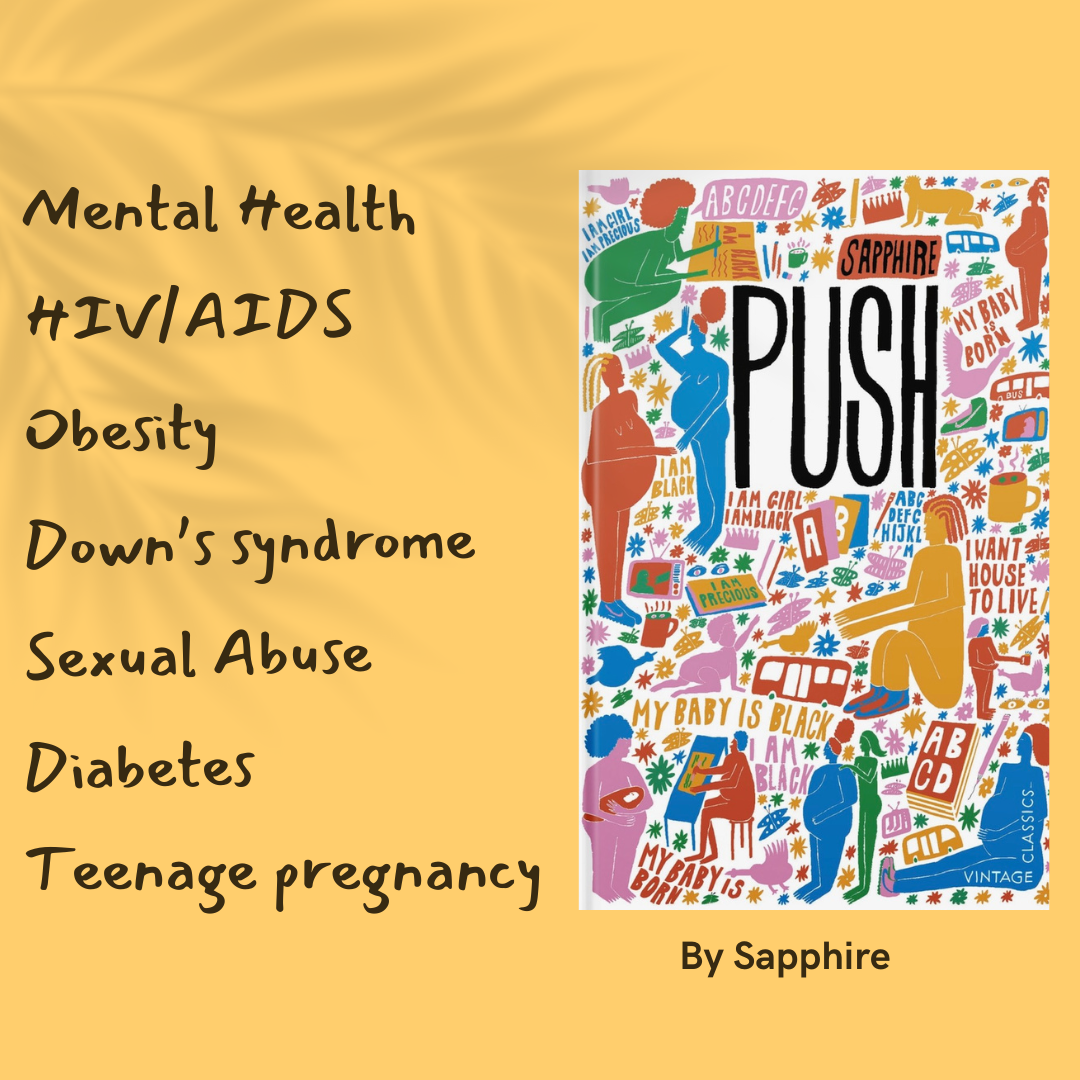by Hollie Nielsen, AWC Central Scotland
 This month, the Global Issues Book Discussion book is Push by Sapphire. Although the book was suggested by the Education Team, many health issues are raised in the book, including obesity, early pregnancy, AIDS, lack of prenatal care, lack of routine hearing and vision checks, etc. One could write many articles about these issues, in addition to the education topics raised. What struck me, however, is the focus Sapphire put on mental health. This article will raise awareness of several mental health areas covered in Push. Although Push is a work of fiction, the author based the book on her teaching experiences in New York City, and she therefore raises many legitimate health concerns.
This month, the Global Issues Book Discussion book is Push by Sapphire. Although the book was suggested by the Education Team, many health issues are raised in the book, including obesity, early pregnancy, AIDS, lack of prenatal care, lack of routine hearing and vision checks, etc. One could write many articles about these issues, in addition to the education topics raised. What struck me, however, is the focus Sapphire put on mental health. This article will raise awareness of several mental health areas covered in Push. Although Push is a work of fiction, the author based the book on her teaching experiences in New York City, and she therefore raises many legitimate health concerns.
Sustainable Development Goal 3 aims to “ensure healthy lives and promote well-being for all at all ages.” Health and well-being are important at every stage of one’s life, starting from the beginning. With respect to mental health, Target 3.4 aims, among other things, to “promote mental health and well-being.”
In Push, the main character is Precious; she’s young, African-American, abused, HIV-positive and illiterate. She gave birth to her father’s baby when she was only 12 and gave birth to a second one at 16. Furthermore, her mother also physically abuses her.
Although Precious is illiterate, she attends school regularly and is determined to learn, to catch up, to be normal. Thus, she is devastated when she is kicked out of school during her second pregnancy. Fortunately for her, she is referred to Higher Education Alternative / Each One Teach One, to the basic reading and writing class.
In this class, not only does Precious learn to read and write, but she also becomes part of a female healing group that improves her mental health. She, her classmates and their teacher create a community that helps heal their traumas and empowers them, both in the journals they write daily in class and in their day-to-day lives.
One of the mental health issues plaguing Precious is low self-esteem; she feels invisible to her parents, teacher and classmates. Being “out of the picture” is painful to Precious. Moreover, she has been bullied all through her school years and has no friends. Sometimes she wishes she would just stop breathing.
Despite her low self-esteem, Precious has an indomitable spirit. She knows school and learning will get her out of her mother’s home and on to a better life; she says she will be the “queen of the ABCs” and that she won’t give up going to school. As she continues to go to school, she believes she has a reason for living, a purpose. She may not know what that purpose is yet, but she believes she is the solution, not the mistake. She works hard and as she is able to read a few words, her teacher is proud of her, and Precious feels good. Her growing self-esteem and indomitable spirit combine to help Precious overcome some of her mental health issues.
In addition to low self-esteem, Precious feels emotional stress resulting from sexual abuse and her HIV-positive status. Her mental suffering is in addition to her physical suffering. While the help Precious receives from school is important, she also finds support and a sense of community from the incest suppport group and a group for HIV-positive 16–21 year old girls. In these groups, Precious feels seen and heard; she finds friends with common experiences. She says “I’m alive inside. A bird is my heart. Mama and Daddy is not win. I’m winning.” These support groups are very important to Precious: “People who help you most (sometimes) is ones in the same boat.” Precious learns to “forgit the WHY ME shit and git on to what’s next.”
Through her school and support groups, Precious learns that she, a survivor of incest and child abuse, has a legitimate place in society.
The United Nations and the World Health Organisation (WHO) have several initiatives to recognise and ameliorate mental health issues in children and adolescents. For more information, follow these links:
- How school systems can improve health and well-being: topic brief: mental health. This topic brief highlights how promoting mental health and well-being supports the achievement of education and learning objectives.
- UNICEF and WHO Joint Programme on Mental Health and Psychosocial Well-being and Development of Children and Adolescents. The bold vision of this program is: “By 2023, children and adolescents living in countries targeted under the Joint Program will experience reduced suffering and improved mental health and psychosocial well-being and development.”
- “Mental health is critically important to everyone, everywhere. All over the world, mental health needs are high but responses are insufficient and inadequate. This ‘World Mental Health Report’ is designed to inspire and inform better mental health for all.”
The Health Team hopes this article has informed you about mental health issues and given you some resources to inspire you to action.
Image courtesy of Tharien van Eck, created in Canva
